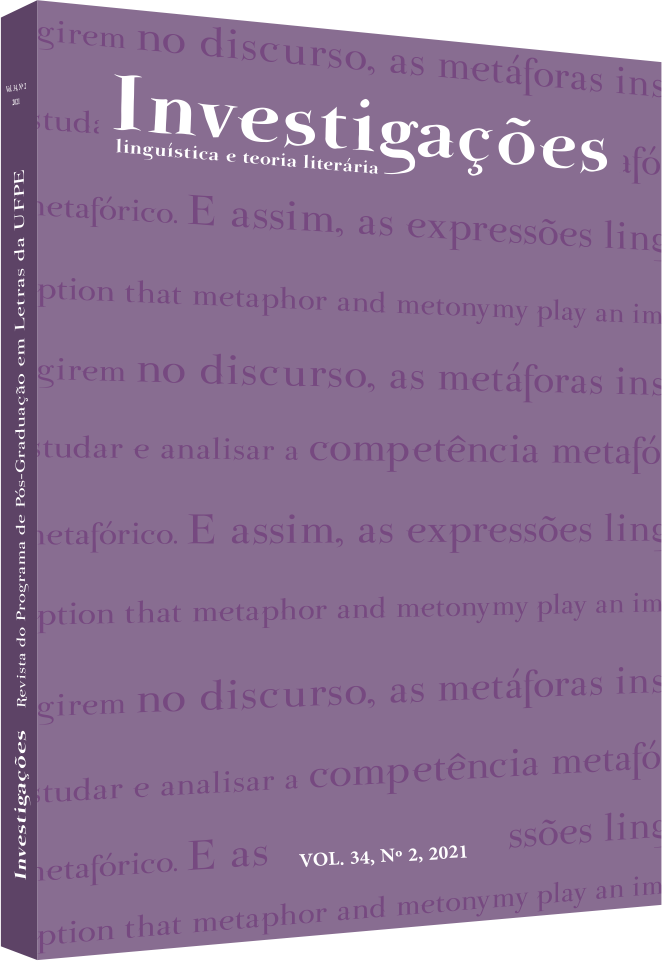Literature in EFL classes: four teachers' experiences in Brazil
DOI:
https://doi.org/10.51359/2175-294x.2021.247565Parole chiave:
English literature, EFL, teachers, classroom.Abstract
Some of the benefits of using literature in EFL classes include improving vocabulary, critical thinking and providing authentic material. Researchers such as Melo Júnior (2015) and Lago (2016; 2017) investigate literature in EFL contexts, noticing how literature can also motivate students. This paper aims to analyze English teachers' experience in Goiás, Brazil, and their relationship with literature in their EFL classes. Its purpose is to investigate whether these teachers use literary works during their lessons. Four teachers were interviewed for this case study. The results show these teachers attribute importance to literature in EFL contexts.
Riferimenti bibliografici
BABAEEL, R.; YAHYA, W. R. B. W. Significance of Literature in Foreign Language Teaching. International Education Studies, Canada, v. 7, n. 4, p. 80-85, 2014. Disponível em: http://www.ccsenet.org/journal/index.php/ies/article/view/35495. Acesso em: 19 de junho 2019.
BLOEMERT, J.; PARAN, A.; JANSEN, E; VAN DE GRIFT, W. Students’ perspective on the benefits of EFL literature education. The Language Learning Journal, v. 47, n. 3, p. 371-384, 2019. Disponível em: https://www.tandfonline.com/doi/full/10.1080/09571736.2017.1298149 Acessado em 19 de julho 2019.
BRASIL. Parecer CNE/CES 492/2001. BRASÍLIA: MEC, 2001.
COLLIE, J.; SLATER, S. Literature in the language classroom: a resource book of ideas and activities. Cambridge: Cambridge University Press, 1987.
DENZIN, N. K.; LINCOLN, I. S. The Sage Handbook of Qualitative Research. California: Sage Publications, 2005.
KLEIN, J., and NEWELL, W. (1997). Advancing interdisciplinary studies. In: GAFF, J.; and RATCLIFFE, J. (Eds.), Handbook of the undergraduate curriculum: A comprehensive guide to purposes, structures, practices, and changes. San Francisco: Jossey-Bass, 1997, p. 393-415.
LAGO, N. A. High education in Brazil: university students contact with English literature. Journal of Teaching and Education, v. 5, n. 1, p. 659-670, 2016.
LAGO, N.A. Understanding metaphorical texts in foreign literature. Humanities and Social Sciences Review, v. 7, n. 1, p. 297-308, 2017.
LAZAR, G. Literature and language teaching: a guide for teachers and trainers. Cambridge: Cambridge University Press, 1993.
LÜDKE, M.; ANDRÉ, M. E.D.A. Pesquisa em educação: abordagens qualitativas. São Paulo: EPU, 1986.
MELO JÚNIOR, O. M. B. de. O ensino de literatura em língua inglesa no curso de Letters: uma abordagem dialógico-pragmática. Bakhtiniana Revista de Estudos do Discurso, v.10, n.1. p. 87-103, 2015. Disponível em: http://www.scielo.br/scielo.php?script=sci_arttext&pid=S2176-45732015000100087 Acessado 19 de julho 2019.
MOHEIMANY, M.; SHIRZADI, G. Integrating literature into EFL classes: the case of bringing short stories into Iranian EFL classes to see its impact on the EFL learners’ language learning motivation and their attitudes towards English literature. Language Teaching Research Quaterly, v. 5, p. 74-84, 2018. Disponível em: http://www.eurokd.com/Resources/Uploaded/Articles/db230a5109f34a7c9427a927c1e3fd0a/20181114205031LTRQ%20Template-0020.pdf Acessado em 21 de julho 2019.
RHOTEN, D., O'CONNOR, E.; HACKETT, E. J. The act of collaborative creation and the art of integrative creativity: Originality, disciplinarity and interdisciplinarity. Thesis Eleven, v. 96, n. 1, p. 83-108, 2009. Disponível em: https://journals.sagepub.com/doi/10.1177/0725513608099121 Acessado 21 de julho de 2019.
ZHEN, C. Characteristics and Strategies of Literature Teaching in the EFL Context in China. International Journal of Electronics and Communication Engineering, International Research Publication House, v. 5, n. 3, p. 35-43, 2012. Disponível em: https://www.ripublication.com/ijepa/ijepav2n1_3.pdf Acessado 21 de julho 2019.
YIN, R. K. Estudo de caso: planejamento e métodos. Porto Alegre: Bookman, 2001.
Downloads
Pubblicato
Come citare
Fascicolo
Sezione
Licenza
Copyright (c) 2021 Anna Carolyna Ribeiro Cardoso, Neuda Alves do Lago

TQuesto lavoro è fornito con la licenza Creative Commons Attribuzione 4.0 Internazionale.
Autores que publicam na Revista Investigações concordam com os seguintes termos:
Autores mantêm os direitos autorais e concedem à revista o direito de primeira publicação, com o trabalho simultaneamente licenciado sob a licença Creative Commons Atribuição 4.0 Internacional (CC BY 4.0) que permite o compartilhamento do trabalho com reconhecimento da autoria e publicação inicial nesta revista.
Autores têm autorização para assumir contratos adicionais separadamente, para distribuição não-exclusiva da versão do trabalho publicada nesta revista (exemplo: depositar em repositório institucional ou publicar como capítulo de livro), com reconhecimento de autoria e publicação inicial nesta revista.
Qualquer usuário tem direito de:
Compartilhar — copiar e redistribuir o material em qualquer suporte ou formato para qualquer fim, mesmo que comercial.
Adaptar — remixar, transformar e criar a partir do material para qualquer fim, mesmo que comercial.
O licenciante não pode revogar estes direitos desde que você respeite os termos da licença.
De acordo com os termos seguintes:
Atribuição — Você deve dar o crédito apropriado, prover um link para a licença e indicar se mudanças foram feitas. Você deve fazê-lo em qualquer circunstância razoável, mas de nenhuma maneira que sugira que o licenciante apoia você ou o seu uso.
Sem restrições adicionais — Você não pode aplicar termos jurídicos ou medidas de caráter tecnológico que restrinjam legalmente outros de fazerem algo que a licença permita.

